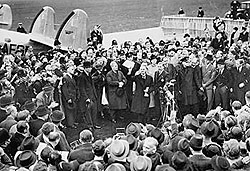Appeasement and The Failure of Democracy


Neville Chamberlain holding the paper containing the resolution to commit to peaceful methods signed by both Hitler and himself on his return from Munich. [1]
France, Great Britain, Italy and other Western European Allies and new central and Eastern European countries signed the Locarno Treaties in 1925 to reinforce their commitment to keep Germany small and separate from Austria.
Great Britain entered the Anglo-German Naval Treaty in 1935 and hoped this would lead to better relations with Germany. From May 1937, Great Britain appeased German demands for lebensraum and plans to annex lands.
While other countries were making nationalistically motivated military advances into other territories to grab land and raw materials, the "great democracies" of the United States, Great Britain, and France hesitated to act in opposition to this aggression. Some historians consider World War II to be a result of the failure of democracy.
- France looked to Great Britain to make the decisions about trying to address imperialist moves by other countries and was reluctant to move against Germany without aid from Great Britain and the United States.
- The United States remained withdrawn and isolated from European affairs.
- The British appeased German demands for lebensraum.
- The League of Nations failed to enforce disarmament and keep the peace among countries after World War I.
Page Notes:
[1] Source: This image from http://en.wikipedia.org/wiki/File:MunichAgreement_.jpg is in the public domain.
Close Window